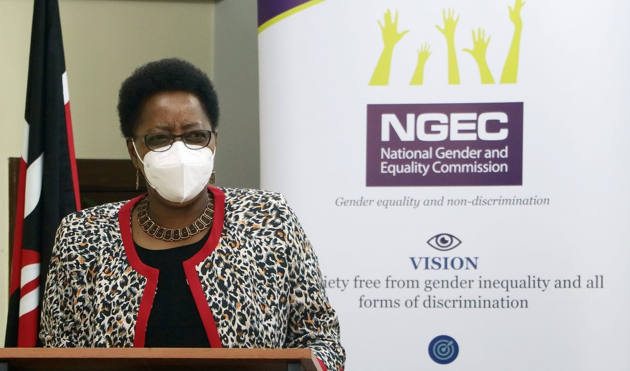STATEMENT ON OBSERVANCE OF THE INTERNATIONAL DAY OF ZERO TOLERANCE TO FGM
The National Gender and Equality Commission (NGEC) joins Kenya and the rest of the world in marking the International Day of Zero Tolerance to Female Genital Mutilation (FGM). This is an awareness day marked every 6th February to educate the public on issues of Female Genital Mutilation (FGM), mobilize political will and resources to eradicate FGM and celebrate achievements and preserve gains made so far in the efforts of ending FGM.
The 2022 theme for this year is “Accelerating Investment to End Female Genital Mutilation”. The theme calls for increased investments in interventions targeted towards ending FGM and in the provision of services to girls and women affected by FGM. It advocates for the enactment and implementation of laws geared towards eradicating FGM and enhancing the capacity of stakeholders entrusted with the mandate of eradicating FGM.
FGM is not only a harmful cultural practice but an infringement of human rights that violates the principles of equality of rights and respect for human dignity. It impedes the enjoyment of rights of women and girls including sexual and reproductive health rights and exposes women to serious health, psychological, physical, social consequences.
According to the Kenya Demographic Health Survey, 2014 the national prevalence of FGM declined from 32 per cent in 2003 to 27 percent in 2008/2009 and 21 percent in 2014 pointing to a positive trajectory towards total elimination. A report by the United Nations Population Fund on The State of the World Population, 2020 indicates that as the COVID-19 pandemic persists, 4.1 million girls are at the risk of being subjected to the practice of FGM in the year 2021. Further, the pandemic has directly slowed down key efforts designed by States, the private sector and communities towards the elimination of all forms of harmful practices including FGM. For example, in Kenya, the community level monitoring mechanisms indicated a smaller number of cases (76) in 2020 ( reported between January and May 2020) as compared to 870 cases reported during the same period in 2019[2], even when other surveillance systems indicated a potential increase in the vice. It is therefore clear that if investments towards eradicating FGM are not accelerated, achievement of the Sustainable Development Goals especially goal No. 5 on gender equality may be a mirage. Recently the Government of Kenya renewed its political commitment to eradicate FGM including increased investment in the monitoring of the FGM prevalence in hot spot counties, and through strengthening the capacity of the Ani-FGM board to apply more comprehensive multi-agency approaches to eliminating FGM in Kenya.
During the Nairobi Summit on International Conference on Population and Development (ICPD25) held in 2019, His Excellency (H.E) President Uhuru Kenyatta made a bold commitment to put an end to FGM by the year 2022. This commitment was further reinforced during the June 2021 Generation Equality’s Action Coalition on GBV, where Kenya committed to Ending Gender-Based Violence (GBV) by 2026.
Further, the Government has in the last year formulated a range of strategies in partnership with affected communities, local, national and international organizations to eliminate FGM. In the last two years, the County has witnessed renewed and intensified efforts including increased investments to ensure the realization of these commitments. Such include among others the unveiling of Standard Operating Procedures by the Office of the Director of Public Prosecutions for consistent and efficient expediting of FGM cases, community-based programs that are culturally sensitive, educational programs encouraging change of social norms, and measurement of the emerging drivers of FGM through the 2022 Kenya Demographic Health Survey. These efforts are further fortified by Kenya’s continued commitment to international and regional obligations to ending all forms of violence and discrimination against women and girls.
Whilst acknowledging all efforts put forth by Kenya, the Commission affirms its position that it is possible to eliminate FGM if all actors are committed and united towards this goal. More investments must be directed to community-based programming to encourage and motivate communities to denounce the behaviour, protect and promote the basic rights of girls and women. Men equally have a significant role in repositioning their families as ‘FGM free entities’. We, therefore, join the world in calling for accelerated investments to end FGM and protect all women and girls from harm.
Thank You.
Dr. Joyce M. Mutinda PhD, EBS
Chairperson


Comments